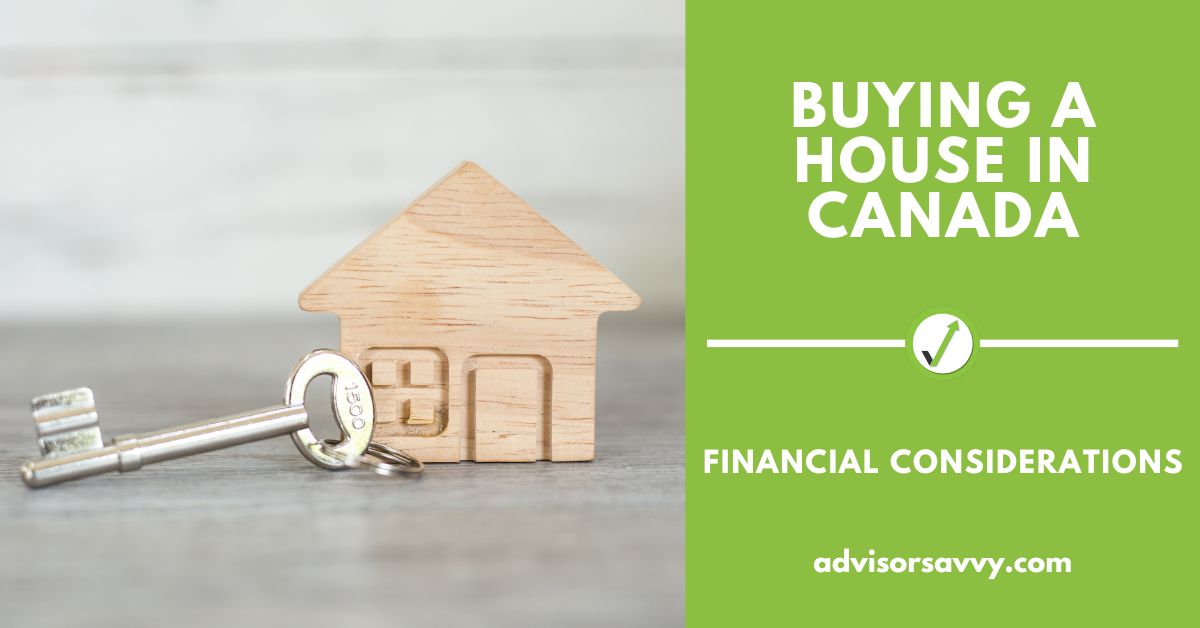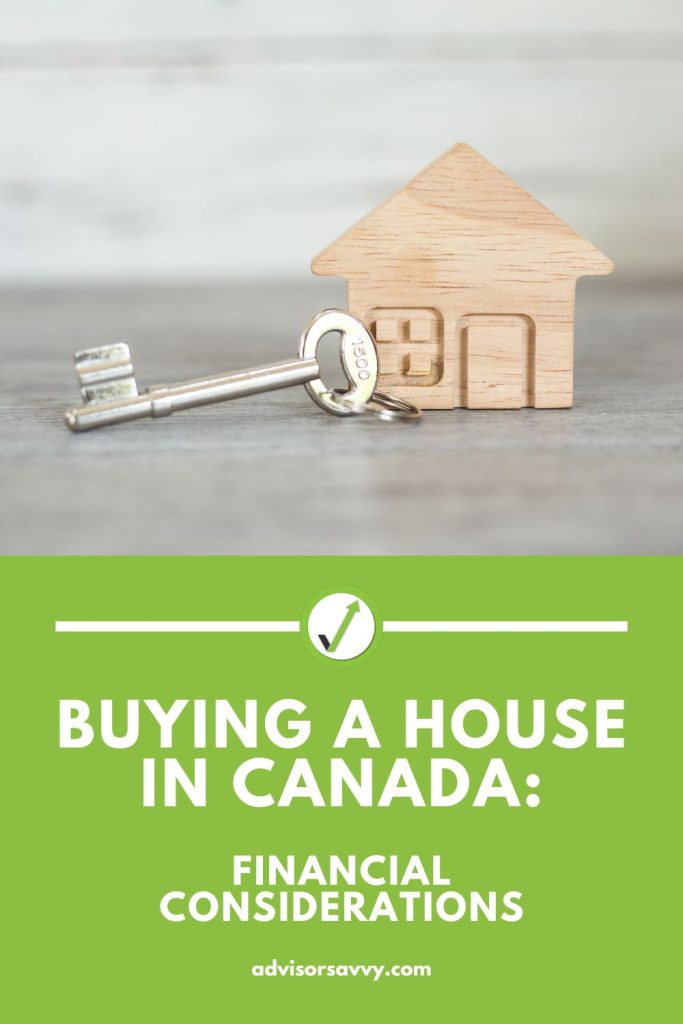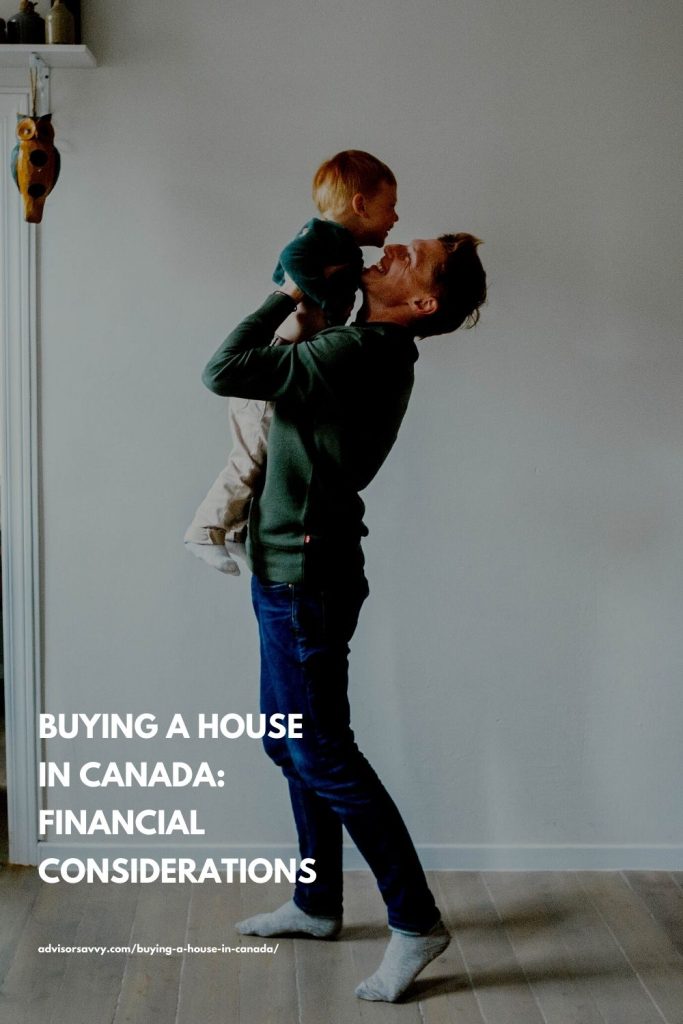
The decision to buy a house is one of life’s big financial moves. It has implications that go beyond the present, creating future obligations and opportunities. With mortgage rates at all-time lows, many Canadians are considering the leap into becoming homeowners. Let’s take a look at buying a house in Canada, the financial considerations, and if it makes sense for you.

Table of contents
- Understand if homeownership is a good decision
- Pros and Cons of Home Ownership
- Pros and Cons of Renting
- Deciding how much house is affordable
- Saving for a down-payment
- Using savings and investment
- Understand and save for other expenses related to homeownership
- Seeking approval for a mortgage
- Evaluate local market conditions
- Choose a realtor and start your search
Understand if homeownership is a good decision
Whether to rent or own property in Canada is a personal decision based on your unique set of circumstances. Before searching the real estate listings, ask yourself a series of key questions:
- Am I financially viable?
- Am I capable of handling such a big purchase?
- Can I support the costs associated with homeownership?
- Do I have the time and ability to deal with basic home maintenance?
- Is homeownership consistent with my long-term goals?
Homeownership could be a good decision if owning your own place, managing day-to-day maintenance like cutting the lawn or clearing snow, and investing in-home repairs or improvements are all aspects of a lifestyle you would enjoy. You may prefer to remain a renter if you recoil from the responsibility and don’t want to spend time and effort maintaining a property.
Reviewing a step-by-step guide from the Canada Mortgage and Housing Corporation (CMHC) may help you decide if now is a good time for you to buy a house: a step-by-step guide to buying a home in Canada.
Pros and Cons of Home Ownership
As a renter, you know that there are limits to how customized you can make your living space. As a homeowner, you would have the freedom to renovate or redecorate as you choose. Homeownership also enables you to build equity in an asset that typically will appreciate in value over time. You would be paying yourself instead of paying a landlord. Depending on the style of the house you choose, it could also offer the potential for rental income.
On the downside, homeownership means ongoing monthly commitments including mortgage, property taxes, and home insurance. Homeowners are responsible for any repairs that might crop up. And over time, when renewing mortgaging, interest rates could increase from the bargain basement level they are at now — meaning higher monthly mortgage payments in future.
Pros and Cons of Renting
Many Canadians prefer to rent. Only first and last month’s rent is typically required for a rental. And often all costs including utilities are included in the bottom line monthly rent. For renters, it’s easy to plan for housing costs going forward. However, there is less certainty for renters because a building owner could sell the property and, for whatever reason, your lease might not be renewed. And because you are paying a flat fee in exchange for living in a rented space you are not building any equity. Your payments are going toward paying someone else’s mortgage and building their equity.
To help with the universal conundrum of ‘rent versus buy’, Mortgage Intelligence has created a useful calculator.
Related Reading: How to Move to Canada
Deciding how much house is affordable
Once you’ve self-assessed whether homeownership is for you, what are the steps to buying a house? The first is to decide how much you can afford to spend on housing. Those low-interest rates can make you feel like big expenditures are possible. But bear in mind that rates can change over time so it’s best to avoid getting ‘carried away’.
It’s important to look at your net worth and what payments you can sustain monthly. Do you have a lot of consumer debt such as credit cards and car payments that already sap your earnings monthly? Is there a way you can consolidate and tidy debt to pay less each month and free up more for homeownership? Have you been setting aside money to use as a down-payment for a home, or will you be borrowing to the max? Do you have equity from a prior home to apply to a new home? All of these factors are critical in defining your budget for house-hunting.
Many financial institutions provide calculators to help you decide what financing you can anticipate when buying your home. An example is this one from CIBC.
Saving for a down-payment
So now you’ve taken an honest look at your goals and what you have to work with. And you’ve decided to become a homeowner. Let’s look at the nitty-gritty of how to fund your house purchase. To buy a house in Canada you will need a cash down-payment — ideally a minimum of 20 percent of the house purchase price. As well, there are up-front costs that will be incurred when the purchase happens.
Looking at your end goal and what cash you currently have available, you may have identified a gap that needs to be filled before you can put in a purchase offer. There are a number of options available to close that gap.
How to save for buying a house:
- Create more personal wealth by saving part of your earnings. Your employer may have a program that enables paying part of your earnings directly into your savings account so that automatic transfers from every pay period are deposited.
- Contribute to a Tax-Free Savings Account (TFSA). Canadians can contribute defined amounts into a TFSA account that lets you save or invest money tax-free. You don’t get taxed when the money is withdrawn and you can use your TFSA to help when buying your home. Here is more information on TFSAs from the Canadian government site
- Save with an RRSP (Registered Retirement Savings Plan). Use RRSPs to save for retirement because money withdrawn from the account is taxable. It is feasible to make a withdrawal from an RRSP account if you need the funds, but a chunk will go to taxes. The exception to that is first-time home buyers.
- Use the Home Buyers’ Plan (HBP). First-time homebuyers are allowed to withdraw up to $35,000 from their RRSP tax-free to apply to the purchase of a home. Here are more details on the HBP opportunity
- Build your nest egg by saving more. With your eye on the prize of homeownership, you can save more by socking away any gift money, inheritance money, tax refunds, and other windfalls to build your savings.
Using savings and investment
The more you can save towards your down-payment, the better. Essentially the down-payment represents what you will pay in cash towards the house purchase. The remainder will be funded by a mortgage. The healthier your down-payment, the less your monthly mortgage payments will be. With more paid down, you will be paying less interest over time to a financial institution or another lender. And the more equity you will build in your home.
If you plan to buy a home in the near-term you will want to keep your savings flexible so you can access your money when you need it. Short-term savings and investment options include savings accounts, short-term GICs (guaranteed investment certificates), low-risk mutual funds, or stocks purchased with a short-term view. Avoid longer-term commitments. That includes multi-year GICs and mutual funds or other investments that levy penalties when you withdraw your money.
Understand and save for other expenses related to homeownership
While everyone talks about down-payments for home buying, there are other perhaps less well-understood costs. Closing costs will total anywhere from 1.5% to 4% of your home’s purchase price. You need to be prepared to pay those fees on the date the sale is completed (closes). Let’s look at those incremental costs and what you should expect.
Home inspection
When you have found a home you’d like to buy, it’s common to include provision for a home inspection in the purchase offer. That means you want to buy the house provided no major issues are found by a qualified home inspector. An inspector provides a comprehensive visual inspection of the house’s overall structure, electrical and plumbing, foundation and roof, and more. Home inspection fees vary but are typically a few hundred dollars, not thousands.
Legal costs
Lawyers are an integral part of real estate transactions in order to protect your legal interests as a home buyer. They check to ensure that the home you are buying has no prior legal claim against it. That’s called a lien which is a legal claim over another person’s property that someone files to ensure a prior debt gets paid. Your lawyer will also review the purchase contract to ensure that everything is in order. They will also handle all the details of the financial transaction on closing and provide a final ledger. Legal fees can vary so ask your lawyer for an estimate in advance of closing so you are prepared.
House insurance
This is a critical requirement of home buying, as you won’t qualify for a mortgage unless you have home insurance in place. You need to arrange that before closing so that your house is covered in case of theft, loss, or damage to the building structure or contents.
Land registration
Your property’s title must be registered under your name prior to the sale closing. Typically your lawyer will submit this on your behalf, but you are required to pay the land transfer tax. The cost is a percentage of your home’s purchase price and your lawyer can advise on the amount.
Adjustments
This is sometimes a surprise to new home buyers so it’s worth noting. The seller of the home you are buying may be entitled to a rebate for something they already paid that carries past the purchase date. For example, they might have paid property taxes that cover the balance of the year. In that case, your lawyer will adjust the ledger accordingly and ‘rebate’ the seller through an adjustment upon closing.
GST/HST fees on new home builds
If you are having your new home built, be aware that either the builder or yourself is liable for paying GST or HST on the home once completed. Some builders do include HST in their sale price, but others do not. This is an important element to be aware of if commissioning a new home build. GST/HST must be covered on closing.
Moving costs
Don’t forget to allocate funds to cover the heavy lifting when you move. Depending on the distance to your new home, how much you have to move (movers calculate costs based on distance and weight), and the complexity of your belongings (such as contents of a wine cellar), you can get an advance estimate on moving costs. And in view of the current coronavirus pandemic, don’t assume movers will be available at the last minute. Book well in advance and nail down the associated cost.
Other considerations
Many Canadians have watched the home renovations TV shows where unexpected issues crop up and shock homeowners with a big price tag. It’s wise to have a contingency fund in case you need to repaint or refurbish anything when you move into your new home. You may also need additional furnishings, appliances, or other décor items to make the house your home.
Also, be prepared to address utility bills and property taxes given those are now your responsibility as a homeowner. Even re-directing mail at the Post Office to make sure you don’t miss any snail mail involves a one-time fee.
If this all sounds overwhelming, use this buying a house financial checklist to calculate your potential exposure.
Seeking approval for a mortgage
Many Canadians buying a house in Canada look for mortgage pre-approval before house-hunting. That means that they approach their preferred financial institution (or shop around to get the best deal) to determine how much mortgaging they qualify for. For example, if you have $160,000 to use as a down-payment and you’re planning to buy a home worth a maximum of $800,000 then you would be seeking pre-approval from the lending institution for a $640,000 mortgage.
To ensure you are an attractive applicant for mortgage providers it’s wise to improve your credit score in advance, pay down other debts as best you can, prepare all your financial documents, and retain your job or source of employment.
Prepared with the right documentation
When you approach the lending institution, you will need to provide full financial information including:
- Tax returns, typically for the prior two years, for you and any co-signer
- Pay stubs or other proof of income
- Bank balances and listing of other assets
- Credit history and current debts
- Proof of identity (driver’s license, Passport)
- Renting history if not a prior homeowner
You can also wait to apply for a mortgage until you’ve found the property you plan to buy. Depending on market conditions, you can choose from a variety of mortgage types including variable (mortgage rate varies but can be locked in whenever you choose) or fixed (mortgage rate is fixed at a certain percentage for a specified term). You can also choose the length of the term which is typically three to five years. With interest rates at an all-time low in Canada, many people are choosing longer terms to enjoy guaranteed low rates for the foreseeable future.
Get acquainted with mortgage terminology
It’s advisable to familiarize yourself with mortgages and related jargon before meeting with a lending institution. The term is the length of time for which the interest rate is established. Amortization is the length of time over which the payments are spread to pay back the loan. Typically mortgages are amortized over 25 to 30 years. Your mortgage payment is determined based on the term, the interest rate, and the amortization period.
If you want help with sourcing the best mortgage for you, a mortgage broker can do the legwork for you. For busy professionals who can’t afford to take the time to assess mortgage rates and shop around for the best deal, mortgage brokers can provide an excellent service. Check if your mortgage broker is paid a commission by the lender only or if you will need to allocate additional commission for their services.
Evaluate local market conditions
You now have a good handle on whether you’re a good candidate to be a homeowner. You’ve assessed your personal financial situation and what you might qualify for in terms of mortgaging. And you’ve looked at steps to buying a house in Canada. Another consideration is the market conditions that exist when you undertake your house search. Is now a good time to buy a house?
At the moment, because of the pandemic and the emphasis on having personal space and options during lockdowns and travel bans, many Canadians are in flux. It’s a seller’s market for most, especially in Ontario where condo renters are looking to make a move, and urban dwellers are migrating to smaller bedroom communities.
As a potential homebuyer, this doesn’t make it impossible to buy, but it could potentially inflate pricing depending on the locale where you plan to buy. You may want to consider options in terms of location and type of housing to find an affordable home.
Choose a realtor and start your search
At times like this, professional realtors can be extremely helpful because they know their markets and can track comparable homes and sales. They may also hear about houses coming on the market pre-listing and enable you to make an offer sooner in situations where bidding wars could ensue.
Buying a house in Canada certainly has many financial considerations but can be well worth the investment of your time, energy, and money for long-term gain.
Read More: How to Find and Choose a Financial Coach

